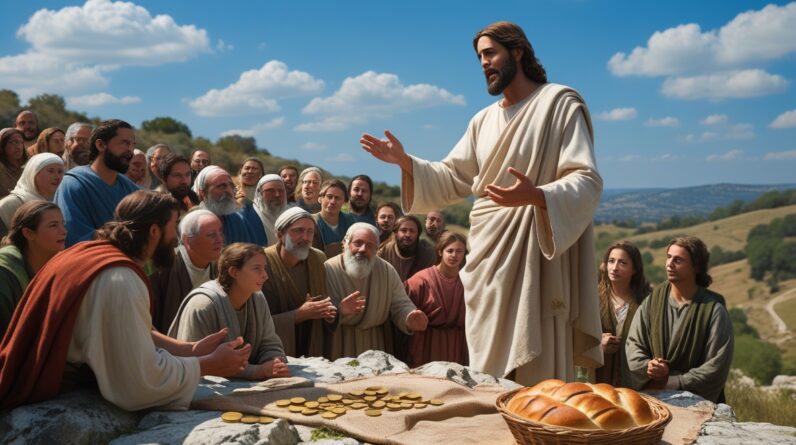Generosity That Transforms: Giving Beyond The Tithe
You’ve probably heard about tithing—giving a tenth of your income—as a basic spiritual discipline. But when you dig into generosity in the Bible, you find something much wider, deeper, and far more transformational than a fixed percentage. This article invites you to move from rules to rhythms, from obligation to overflow. You’ll discover biblical principles, practical steps, and real-life examples that help you give beyond the tithe in a way that changes you and the people around you.
Why talk about giving beyond the tithe?
You might wonder why we need to go beyond what many consider a faithful practice. The short answer is that generosity in the Bible isn’t meant to be boxed into a single number. Scripture repeatedly calls people into a lifestyle that reflects God’s heart: sacrificial, abundant, and transformative. When you begin to live that way, your giving shifts from duty to delight—affecting your relationships, your priorities, and your witness.
What the Bible says about generosity in the Bible
If you want a quick tour of scriptural teaching on generosity, there are passages that repeatedly pop up. You’ll find themes of sowing and reaping, cheerful giving, sacrificial offerings, and radical community sharing. For example, Paul teaches the staggering reality of generosity in 2 Corinthians: “Whoever sows sparingly will also reap sparingly, and whoever sows generously will also reap generously” (2 Corinthians 9:6-8). Jesus highlights the value of giving from the heart in the widow’s mite story (Mark 12:41-44) and instructs you to give in secret, trusting God to reward you (Matthew 6:2-4). You’ll see that generosity in the Bible is practical, spiritual, and communal.
Tithe versus extravagant generosity
Tithing is rooted in Old Testament law and practice and served important roles—sustaining priests, supporting temple worship, and caring for the poor. Malachi addresses the people’s failure to bring the tithe and calls them to faithful giving: “Bring the whole tithe into the storehouse” (Malachi 3:10). But the New Testament moves you toward a broader ethic: generosity that flows from grace, not legalism. In fact, Scripture encourages you to give generously, cheerfully, and beyond what’s required (2 Corinthians 9:7). The difference isn’t whether you tithe but whether your heart is open to larger, sacrificial participation in God’s work.
Principles of generous living from Scripture
When you study generosity in the Bible, certain guiding principles emerge. They’ll inform how you think, plan, and act.
Sowing and reaping: invest with expectation
Paul uses agricultural language to encourage generosity and faith. He tells you that giving is an act of sowing—what you put out is what you stand to receive, often in ways that exceed monetary return (2 Corinthians 9:6). When you give expecting God to multiply, you shift from scarcity to stewardship.
Cheerful giving: give with the right heart
Scripture emphasizes attitude. God loves a cheerful giver, not someone who gives grudgingly or under compulsion (2 Corinthians 9:7). When you give joyfully, your generosity becomes worship and testimony.
Trust and provision: freedom from fear
Jesus teaches you not to be consumed by worry about material needs and to store up treasures in heaven (Matthew 6:19-21, 25-34). Generosity in the Bible is tied to trusting God’s provision. When you act out of trust, giving becomes easier.
Giving to the poor and needy: love made practical
Numerous passages urge you to care for the vulnerable. Proverbs calls generosity to the poor a kind of lending to the Lord (Proverbs 19:17), and Isaiah calls feeding the hungry and helping the oppressed true worship (Isaiah 58:10). Jesus makes caring for the needy a test of eternal significance (Matthew 25:35-40). That’s generosity in the Bible that transforms communities.
Radical examples: the widow and the early church
Actions speak louder than percentages. The widow who gave all she had at the temple demonstrated faith greater than many wealthy donors (Mark 12:41-44). The early church modeled communal generosity, sharing possessions so nobody was in need (Acts 4:32-35). These stories push you beyond minimums into sacrificial, life-altering generosity.
Generosity as worship: giving honors to God
The Bible consistently connects generosity with worship. Hebrews tells you not to forget to do good and to share, for such sacrifices please God (Hebrews 13:16). When you give, it’s an expression of trust, love, and obedience that honors God.
How to move from tithing to abundant giving
If you’re ready to expand your generosity, you’ll want practical steps that make spiritual commitments sustainable.
Start with prayer and reflection. Ask God to reveal your priorities and to soften your heart toward sacrifice. Budget intentionally: plan for the tithe and then designate an overflow category for generous giving. Treat generosity as an investment rather than an expense. Commit to specific actions—giving a percentage above your tithe for a season, funding a family in crisis, or supporting a ministry start-up.
You’ll also want accountability. Share goals with a trusted friend or community. Track your giving and celebrate stories of impact. Finally, diversify how you give: money isn’t the only resource. Your time, skills, connections, and hospitality are all powerful ways to extend generosity beyond the tithe.
Overcoming common barriers to generous living
Let’s be honest: generous living isn’t always easy. If you’re held back, you’re not alone.
Fear of scarcity is one major barrier. The antidote is practicing trusting obedience—starting small, seeing God’s faithfulness, and letting your trust grow. Another barrier is entitlement: you may feel you’ve earned what you have. Scripture invites you to remember that everything ultimately belongs to God (Psalm 24:1). Pride and suspicion of where money goes can also block generosity. Combat that by choosing reputable partners, staying involved, and giving as a learner. Finally, busyness can mask apathetic hearts. Make generosity a regular habit—scheduled and intentional—so it becomes part of your rhythm rather than a sporadic impulse.
Stories of transformation through generosity
You’ll find many biblical and modern examples where generosity changed lives and communities.
Biblically, the early church’s generosity led to practical abundance and spiritual growth (Acts 2:44-45). Barnabas sold land and gave the proceeds to the apostles, which marked him as a encourager—literally “son of encouragement” (Acts 4:36-37). The story of the Good Samaritan is generosity in action—risking time and resources for a stranger (Luke 10:30-37). Modern examples—from microfinance initiatives that lift families out of poverty to congregations that adopt neighborhoods—show the same pattern: generosity multiplies hope, dignity, and capacity.
The role of church and community in generous living
Generosity in the Bible is rarely a solo sport. Communities organize resources, celebrate giving, and protect the vulnerable. Paul’s letters to the churches show coordinated giving for those in need (see the Jerusalem gift in 2 Corinthians 8-9: 2 Corinthians 8:1-5). When you give beyond your tithe, your local church can be a hub for multiplying impact—channeling funds, vetting ministries, and mobilizing volunteers. At the same time, involvement ensures transparency and spiritual formation, helping your generosity stay grounded in biblical purpose.
How generosity transforms you and your community
You might expect generosity to mostly benefit recipients. It does, but it also transforms givers. Generosity loosens your grip on materialism, strengthens your trust in God, and increases your joy. Psychologists and spiritual writers affirm that giving boosts mental health, combats isolation, and fosters purpose. On the community level, consistent generosity creates social capital: neighbors care for each other, ministries meet needs, and systemic problems get addressed. That’s generosity in the Bible made relevant to your modern context.

Practical ways to give beyond the tithe today
If you’re ready to act, here are tangible options to expand your giving. These are practical, repeatable, and adaptable to your season of life.
- Start a “generosity fund” separate from your regular expenses to cover overflow giving.
- Sponsor a family or student, locally or globally, for a set period.
- Give time: mentor youth, volunteer at a food bank, or offer pro bono services.
- Practice hospitality: open your home for meals, study groups, or respite for someone in need.
- Invest in local entrepreneurs through microloans or community lending circles.
- Advocate: use your voice to support policies and organizations that protect the poor and marginalized.
- Support church planting and new initiatives that reach unreached communities.
Each of these actions moves you from transactional giving to relational investing. You’re not just writing checks; you’re building hope.
Measuring impact and staying accountable
You’ll want to know your generosity actually helps. Measuring impact doesn’t require an MBA, but it does require intentionality.
Track gifts and outcomes. For financial gifts, ask for regular reports or stories from organizations you support. For personal involvement, journal changes you notice in relationships or community indicators—food security, school attendance, or employment. Have periodic reviews with your accountability partner to celebrate wins and adjust strategies.
Transparency is crucial. When you give through churches or nonprofits, select partners who publish financials, share program updates, and welcome questions. Good stewardship on your part means you’ll invest in sustainable, not just sensational, outcomes.
Generosity in seasons: when giving looks different
Your capacity to give will change over time. There will be seasons of abundance and seasons of tightening belts. Generosity in the Bible recognizes this reality. Deuteronomy, for instance, shows provisions for giving that adapt to cycles of blessing and need (Deuteronomy 15:10). You don’t fail God by adjusting your level of giving in hard times; you simply steward what you have with wisdom and faith. In every season, generosity is a posture—some seasons emphasize giving time, others finances, and sometimes you give sacrificially even when resources are limited, trusting God’s sustaining grace.
The ethics of generous giving: dignity and justice
As you expand your giving, remember dignity. Generosity in the Bible models practices that protect recipients’ dignity rather than creating dependency. Isaiah challenges you to “share your food with the hungry” and to act justly (Isaiah 58:10). Justice-minded giving asks questions: Does this gift empower or enable? Does it address symptoms or root causes? When you give thoughtfully—investing in education, economic opportunity, and systems change—you honor both the immediate need and the long-term flourishing of people.
Generosity, wealth, and responsibility
If you have significant resources, generosity in the Bible calls you to stewardship, not hoarding. Paul instructs the wealthy to be generous and ready to share so that their generosity yields true riches in a godly life (1 Timothy 6:17-19). Jesus warns that wealth can harden the heart, but it can also be a tool for immense good when held with open hands. You’ll be tempted to protect possessions; instead, let your wealth become a catalyst for kingdom work and neighbor care.
Giving that risks: faith, sacrifice, and obedience
Some acts of generosity demand real sacrifice. Abraham’s willingness to offer Isaac (Genesis 22) and the widow’s mite both illustrate costly faith. You may be asked to step into similar territory—giving time, reputation, or finances in ways that make you vulnerable. Generosity in the Bible often involves risk: of being taken advantage of, of making mistakes, or of social cost. But it’s precisely in those risks that faith grows. When you respond with obedience, you often find God’s provision and presence in surprising ways.
Teaching the next generation to be generous
If you want a legacy of generosity, teach it to your family and community. Model transparency about giving, involve kids in charitable choices, and celebrate stories of impact. Jesus used small, tangible lessons—feeding five thousand, the widow’s offering—to teach values. You can do the same by making generosity normal: give a portion of allowance, volunteer as a family, or let children participate in decision-making. The gift of a generous heart is one of the best legacies you can leave.
Practical tools to help you stay generous
Use simple systems to help your generosity stick.
- Automate gifts where appropriate—set up recurring donations to causes you trust.
- Create a “stretch goal” line in your budget to fund special needs beyond the tithe.
- Keep a giving journal to record stories and answered prayers.
- Partner with organizations that do regular reporting so you see outcomes.
- Use financial planning that includes charitable giving as a core line item.
These tools help you move from occasional generosity to a sustainable lifestyle where giving beyond the tithe becomes natural.
Common misconceptions about generosity in the Bible
You may have heard that giving is only about money, or that generosity guarantees material blessing, or that only large gifts matter. Scripture corrects these myths. Generosity in the Bible values motive over magnitude and often highlights small, sacrificial acts as far more significant than public displays (Matthew 6:1-4). While God sometimes blesses materially, the primary outcome is spiritual formation—your heart becoming more like God’s. Every act of generosity contributes to God’s work, no matter the size.
Final encouragement: generous living as a transformative journey
You don’t have to get everything right to start. Generosity is a practice—one that matures as you practice it. Start where you are: a small monthly gift, an hour of volunteering, a meal for a neighbor. Watch how God uses your obedience to stretch your heart and bless others. The Bible’s portrait of generosity is expansive, radical, and deeply practical. As you embrace generosity in the Bible’s spirit—open-handed, sacrificial, and joyful—you’ll find your life shaped and your community renewed.
If you want a closing scriptural nudge: Jesus taught, “It is more blessed to give than to receive” (Acts 20:35). Let that blessing shape your choices.
Explore More
For further reading and encouragement, check out these posts:
👉 7 Bible Verses About Faith in Hard Times
👉 Job’s Faith: What We Can Learn From His Trials
👉 How To Trust God When Everything Falls Apart
👉 Why God Allows Suffering – A Biblical Perspective
👉 Faith Over Fear: How To Stand Strong In Uncertain Seasons
👉 How To Encourage Someone Struggling With Their Faith
👉 5 Prayers for Strength When You’re Feeling Weak

📘 Jesus and the Woman Caught in Adultery – Grace and Mercy Over Judgement
A powerful retelling of John 8:1-11. This book brings to life the depth of forgiveness, mercy, and God’s unwavering love.
👉 Check it now on Amazon 🛒💥
🔥 “Every great message deserves a home online.” 🌍💬🏡
Don’t let your calling stay hidden. Start a Christian blog or website using Hostinger — with 99.9% uptime, a free domain, and SSL, your voice can shine for God’s glory anytime, anywhere.
💥 Begin today. 🛒 Try it RISK-FREE! ✅
✝️ “Your body is God’s temple — care for it with purpose.” 💪💖🏛️
Renew your energy and restore balance naturally. Mitolyn helps support a healthy metabolism, giving you the vitality to live out God’s calling with strength and confidence.
🔥 Unlock Your Metabolic Power! ⚡Burn More Calories & Feel Great With Mitolyn. 💪
👉 Start Today. 🚀 Check Price Now. 🛒💰
💰 As a ClickBank & Amazon Affiliate, I earn from qualifying purchases.
📖 Acknowledgment: All Bible verses referenced in this article were accessed via Bible Gateway (or Bible Hub).
🚀 Want to explore more? 👉 Dive into our new post on Why Jesus? and experience the 🔥 life-changing truth of the Gospel!








